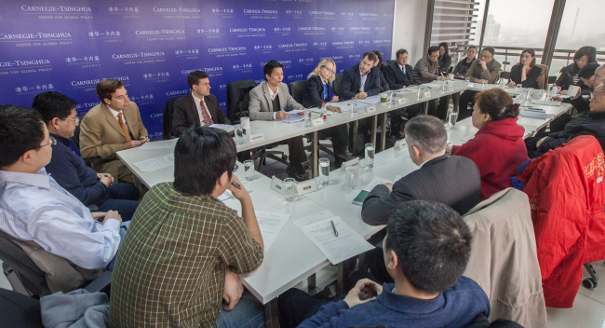Registration
You will receive an email confirming your registration.
IMGXYZ3516IMGZYXWith the death of Kim Jong-Il, global attention has intensified on North Korea and the Six Party Talks, which have been halted since April 2009. In the seventh installment of the Arms Control Seminar Series, Li Hong, Secretary General of China Arms Control and Disarmament Association, and Paul Haenle, Director of the Carnegie-Tsinghua Center for Global Policy, discussed engagement with North Korea on nuclear and security issues with a panel of U.S. and Chinese experts. Carnegie’s Lora Saalman moderated this event.
Regime Challenges
Kim Jong-Un has inherited a nation rife with internal problems, most notably a failing economy, noted one Chinese expert. There is pressure to address these concerns, as the new leader also faces international ties strained by a lack of trust, he added.
- Fragility: One Chinese expert emphasized that North Korea is still dealing with internal issues such as poverty and food shortages, which will increase the fragility of regime change. The potential for power struggles among the elite in North Korea is real and political schisms are already occurring, he noted. Thus, while the succession appears to be going smoothly, it is “artificial and overplayed.” The denuclearization process is not likely to resume while consolidation of power remains North Korea’s top priority, added other Chinese expert.
- Stability: Ideological change takes time, argued one Chinese expert. Instead of reform, the international community should focus on regional stability and confidence building measures, he added. North Korea’s political system is actually quite stable, as it has a closed society and lacks opposition parties, stated another Chinese scholar. While the new leadership in North Korea is more familiar with the West, which could potentially stimulate reform, this process is long-term, he maintained. In fact, the DPRK is likely to become more inflexible in the interim to try and protect its internal stability, asserted one Chinese expert.
- Change: One of the U.S. participants stressed that there is a difference between U.S. advocacy for “change” and the concept of “regime change” when it comes to North Korea, explaining that the United States seeks the former, not the latter. Overall, the United States has not changed its position on its goals for North Korea, he said, but at the same time it does not expect any immediate changes or initiative for discussion. Another U.S. participant argued that there may be greater U.S. flexibility on engaging North Korea. However, the United States would be unlikely to reach out at the moment, as this might damage the new North Korean leadership’s position.
Returning to Talks
The Six-Party Talks is still the best mechanism for tackling the nuclear issue, argued one Chinese expert. However, he warned that the international community should be realistic about the deliverables. In order to come back to the table, several Chinese and U.S. participants argued that all parties at the talks must reaffirm their preexisting agreements, in particular the September 19, 2005 Joint Statement pledging all parties to “commitment for commitment, action for action.”
- Timing: One of the U.S. participants highlighted the importance of an improvement in North Korean and South Korean relations prior to a return to nuclear talks. A Chinese expert responded that while beneficial, a warming of ties between the two should not be a precondition for talks. Another U.S. expert argued that lack of any preconditions would send the wrong message and could elicit further provocations similar to the Cheonan sinking and the shelling of Yeonpyeong island.
- Scope: One Chinese expert suggested that the Six Party Talks could be expanded to include regional security in Northeast Asia. He posited that a regional security arrangement might serve to address North Korea’s security concerns. In facing the uncertainty surrounding the new regime, a U.S. participant advocated an assessment of possible worst-case scenarios. One Chinese expert stated that while it is normal for militaries to take into account such scenarios, it is dangerous for governments to do so. He underscored China’s overall goal in promoting stability.
- Pressure: Outside pressure on the DPRK would only further increase tensions, stated one Chinese expert. In this light, he said that the United States, South Korea, and Japan should reconsider their advocacy for trilateral talks. Noting that 2012 is an election year, this participant argued that high-level exchanges should continue and stressed that it is imperative to dissuade the DPRK from conducting another nuclear test.
U.S.-China Cooperation
One Chinese expert highlighted the difference in U.S. and Chinese approaches to North Korea, with the former preoccupied with nuclear issues and security and the latter focused on economic and political stability.
- Leverage: One of the U.S. participants stressed that China has a much better understanding of the conditions in North Korea than the United States. A Chinese expert noted that while there are significant bilateral exchanges between the two nations, Beijing does not have as much leverage over the DPRK, as other powers believe. While China is an important aid partner and has expressed its support for the new regime, the level of trust outside of the economic partnership is lacking, he said.
- Caution: U.S. policy and reaction towards the DPRK has been cautious, in the opinion of one Chinese participant, but at the same time lacks consistency. Given that U.S. experts predict regime collapse, he questioned the level of U.S. incentive to negotiate. Nonetheless, he advocated closer talks between the United States and North Korea. Another Chinese expert queried whether the U.S. military shift towards the Asia-Pacific region might have a lasting impact on the North Korean question.
- Reversal: While the United States has increased its interest in the Six Party Talks as a mechanism for engaging North Korea, the opposite is true of China, argued one Chinese scholar. Another Chinese expert expressed pessimism that denuclearization would ever occur. In spite of these differences, China and the United States must find a way to enhance cooperation, concluded one Chinese participant.
